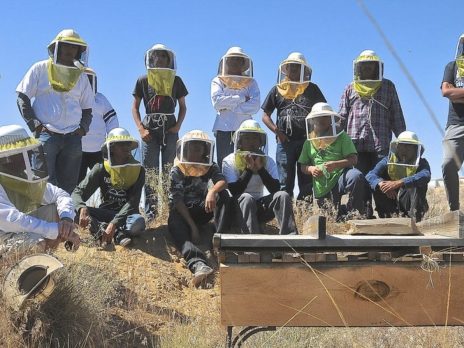Rural Foods Pathways Project
The Rural Foods Pathways Project (RFPP) works with community partners to address food insecurity in Northern Arizona. Our projects are grounded in the ideal that access to nutritious, affordable, and culturally appropriate foods is a right of every human, especially in rural communities where food insecurity is pervasive.
Under the direction of project lead Peter Friederici, and with the help of funding from the Sustainable Economic Development Initiative, we work by linking graduate and undergraduate students with food pantries, food producers, and planners. Our goal is actionable, highly relevant research that produces measurable change and serve communities.
Our work was kick-started by a Community-Campus Partnership Support grant from NAU’s Southwest Health Equity Research Collaborative. Learn more about the project’s beginnings here or read an update in the 2023 NAU Foundation report. Or explore our projects below.
Improving Rural Food Pantry Distributions Accordion Closed
The RFPP works with the Community-University Public Inquiry (CUPI) undergraduate research program at Northern Arizona University. Since Fall 2021, undergraduate teams have partnered with St. Mary’s Food Bank to improve food pantry services across Northern Arizona. They have administered surveys and conducted interviews with pantry food recipients in multiple communities across five Northern Arizona counties. They have inventoried small convenience stores in those communities to learn about pricing and local availability of groceries, and have provided St. Mary’s and local agency partners with actionable recommendations to improve services. Students also regularly volunteer at rural food pantries in order to learn about distribution processes and forge informal connections with organizers, volunteers, and clients.
Across six semesters, graduate students Reilly Caldwell, Zenya Ledermann, and Sufyan Suleman have mentored more than 60 undergraduates as they have worked on semester-long projects. View a 2023 fact sheet about our principal findings.
CUPI student Ryan Clancy delivering food box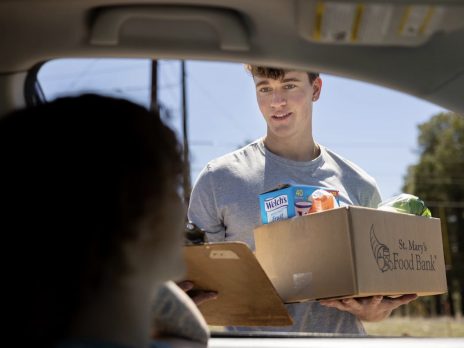
“St. Mary’s Food Bank over the past two years has had a wonderful collaboration with NAU and an interdisciplinary group of students in the CUPI program. The NAU group has conducted boots-on-the-ground outreach and surveying of our agency network in some of our most rural communities. The feedback we have received from these communities has been extremely valuable as we refine our menu to better meet the needs of our neighbors, who have provided information to us on how we can improve our food offerings, frequency, hours of operation, and overall impact.”
—Ceara Chirovsky, Senior Programs Manager, St. Mary’s Food Bank Alliance
CUPI students Bree Bigelow and Ana Papen-Gould on volunteer duty at the Yucca Community Food Pantry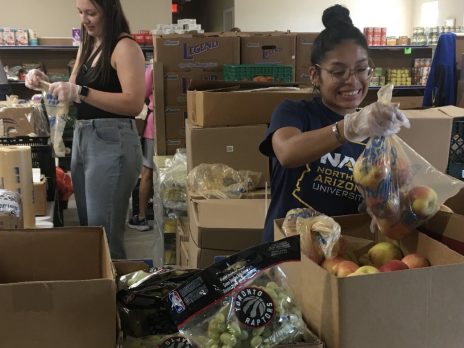
Community-Engaged Sustainable Food Systems Education Accordion Closed
In 2023 the Sustainable Communities Program received a four-year, nearly $400,000 grant from the U.S. Department of Agriculture’s National Institute of Food and Agriculture. Part of the Institute’s Hispanic-serving Institutions (HSI) Education Grants Program, the grant will fund ongoing partnerships with Flagstaff-area schools that support educational programs centered on school gardens.
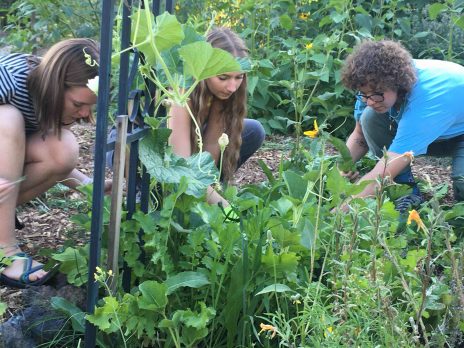
The primary focus of the “Addressing Barriers to HSI Student Retention through Community-Engaged Sustainable Food Systems Education” project is to enable young people to enter future food- and agriculture-related jobs even as climate change and other pressures rapidly change foodscapes. The project will fund 27 undergraduates for semester- or summer-long internships in which the students will work closely with students in Flagstaff elementary and high schools with school garden programs. The project’s goals include improving recruitment and retention of undergraduates from underrepresented populations, training them in both food systems and mentorship skills, and developing a school-to-university pipeline in which K-12 students will learn from undergraduate mentors.
Principal investigators for the project are Peter Friederici, Alder Keleman-Saxena, and Rosemary Logan. Read more in the NAU News, or see the project website here.
Undergraduate internships began in summer 2024, and we are actively recruiting for interns for the Fall 2024 and Spring 2025 semesters—especially those with experience and interest in gardening and/or mentoring children. Internships are paid and typically require 10 hours of work each week. If you’re interested, apply here!
McAllister Ranch Planning Accordion Closed
Permaculture, or “permanent agriculture,” is a sustainable means of producing food by developing harmonious, place-based means of working with nature. Faculty members Rosemary Logan (School of Earth and Sustainability) and Peter Friederici (Sustainable Communities Program) have been developing a permaculture-based proposal to develop a new community urban farm on the city-owned McAllister Ranch property on the edge of Flagstaff.
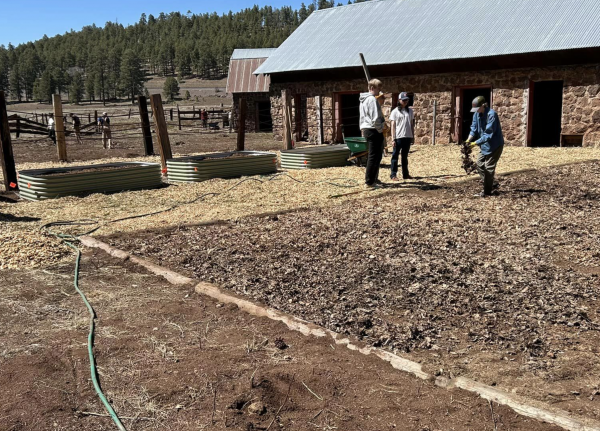
Foundational work for this project was carried out by students in a Fall 2023 Introduction to Permaculture class taught by Logan and Friederici. The planning process was also kick-started by a $5,000 Maxwell-Lutz Community Impact Award granted to the project and by the Arizona Climate Resilience Corps. Together, these funds allowed the hiring of graduate student Sufyan Suleman and undergraduate student Ben Steller, who together are researching site history and urban farm models, reaching out to potential project partners, and working to develop a final project report to the City of Flagstaff.
The City of Flagstaff has designated McAllister Ranch as the latest addition to its Urban Farm Incubator program, and held an initial Community Day at the site on April 13.
Climate-Smart Agriculture Accordion Closed
The RFPP is the Northern Arizona liaison organization in the Climate-SMART (Specific Management for Arizona Resilience and Transformation) Agriculture Best Management Practices project. Funded by the U.S. Department of Agriculture, this five-year, $4.9 million project is led by the Arizona Association of Conservation Districts. It will incentivize farmers and ranchers to reduce tillage and artificial soil inputs, use diverse cover crops, and increase soil quality and carbon storage. The project focuses in part on relationship building and knowledge sharing between Native American farmers and ranchers and producers in other communities. Producers enrolled in the program will receive annual per-acre payments to incentivize the use of climate-smart practices. Small-scale and Indigenous producers are strongly encouraged to apply. In 2024 the project team will be holding Listening Sessions throughout the state to learn about producer interests and best regionally appropriate practices. If you’re a Northern Arizona farmer or rancher who might be interested, let us know by e-mailing ruralfoods@nau.edu.
Biochar for Agriculture Accordion Closed
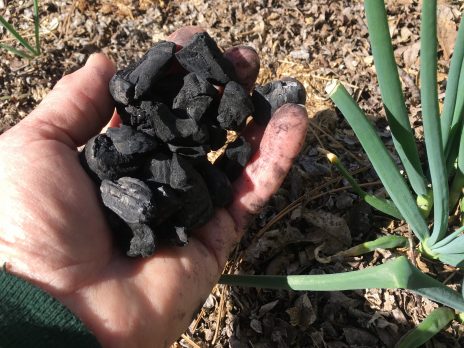
When woody debris or other organic material is burned in low-oxygen environment, the result is biochar, a black substance with a very high carbon content that can increase soil’s capacity to store both nutrients and water. Biochar accomplishes this because it has a highly complex structure of pores. Biochar is also a very stable form of carbon, making it an effective means of storing carbon in soils for the long term—an important consideration at a time of climate change.
Producing biochar may be a viable way to use some of the large quantity of woody material removed from Northern Arizona pine forests during thinning operations. Currently, much unmarketable material is burned onsite in slash piles, a practice that increases fire danger and causes smoke impacts. Turning that material into biochar may be a better way to go, as the biochar can both sequester carbon and improve soil health. Yet more needs to be learned about how plants and soil microorganisms respond to biochar in Northern Arizona soils.
NAU’s Ecological Restoration Institute has produced a test batch of biochar and is currently testing its use in forest restoration applications. The RFPP has partnered with the ERI and several Northern Arizona growers who are testing its use in agricultural soils. If you’re interested in participating, let us know at ruralfoods@nau.edu. Or download our Biochar Testing Guide.
Food Producers Summits Accordion Closed
During two COVID-inflected years, 2021 and 2022, the RFPP convened two Northwestern/Northern Arizona Food Producers Summits in order to explore how peer-to-peer networking could continue and grow when face-to-face meetings were difficult. They provided hybrid in-person/virtual meetings in which small-scale local food producers could learn, network, and share experiences, all with the goal of strengthening regional food systems. The events included a day-long virtual forum with presentations, training workshops, and networking opportunities focused on presentation booths. Workshop topics ranged widely, from animal raising to food-handling safety to marketing through social media. Some attendees also attended in-person field trips held in Flagstaff, Sedona, Kingman, and Paulden.

Download a copy of each summit booklet here: Summit Booklet 2021 and Summit Booklet 2022
Local Foods Accordion Closed
Locally produced food can be a key element of sustainable food systems: it can be fresher, tastier, and healthier than food imported long distances; it can support local livelihoods; and it is often tightly woven into local traditions and cultures. But despite these many virtues, there’s great uncertainty about what local food is. What does “local” mean? How far can it travel from source to consumer and still qualify as “local”? How do definitions of “local” vary across different geographies? RFPP research associate Darren Bingham asked these questions in his Sustainable Communities thesis, for which he conducted a rhetorical analysis of visions and goals from local food proponents all across Arizona. He learned that definitions vary widely, and that they can be tied to qualities as specific as watersheds, county boundaries, and local climatic conditions; but they can also be linked to much fuzzier qualities such as whether buyers perceive a particular relationship with producers.
Read a summary of Darren’s findings in the journal Applied Geography, or visit the mapping interface to the data.
Regional Food Systems Planning Accordion Closed
Our work fits under the umbrella of the Arizona Statewide Food Action Plan developed by the Arizona Food Systems Network, which set goals for food production, distribution, and sustainability in the 2022-2024 timeframe. We use the plan’s metrics to help determine which short-term goals and longer-term monitoring or planning processes are most likely to ensure that our work in Northern Arizona is congruent with larger goals. The RFPP is also part of the planning and implementation process for the City of Flagstaff’s “Assessing and Growing a Community Food System” project, a multi-year effort to develop a fine-grained understanding of the current state of the food system in the city and beyond, and to create an action plan outlining steps for improvement. We also worked with our partners at Flagstaff Foodlink to research how Northern Arizona food production and distribution systems were affected by COVID-19, as documented in a statewide report.
Sustainable Beekeeping Accordion Closed
In collaboration with the Northern Arizona Organic Beekeeping Association, the RFPP in summer 2024 is sponsoring a four-session Introduction to Local Organic Beekeeping workshop led by experienced beekeeper and sustainability instructor Dr. Patrick Pynes.
Participants experience working hands-on with local bee colonies, and learn practices and patterns specific to beekeeping in the arid Southwest uplands.
Click here for information on how to register!
